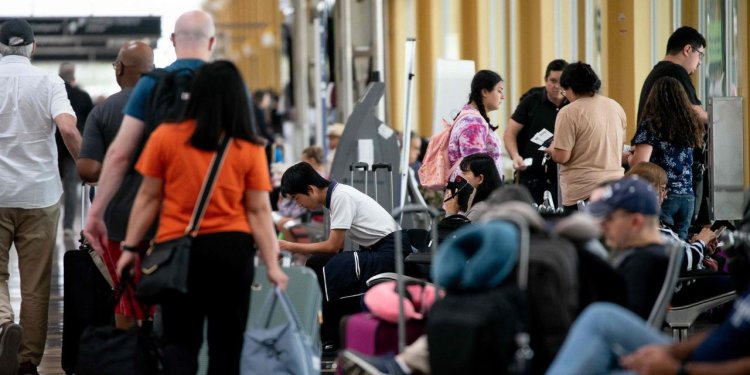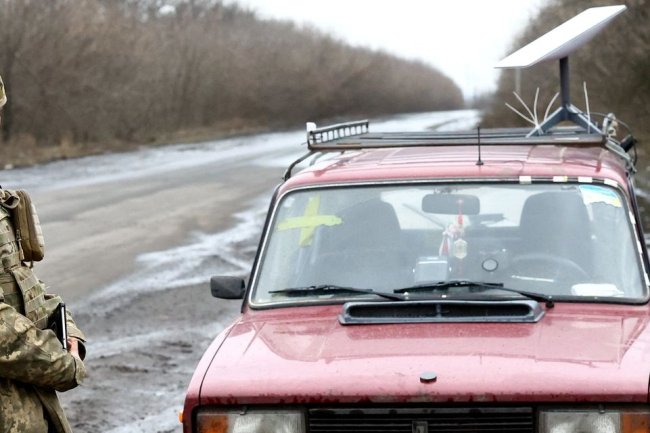Washington Takes On Your Air Travel Nightmares
Lawmakers seek agreement on pilot training, retirement age and flights at Washington area’s Reagan airport Lawmakers and airlines are debating whether to add more flights at the congested Ronald Reagan Washington National Airport. Photo: stefani reynolds/Agence France-Presse/Getty Images By David Harrison and Alison Sider Updated July 19, 2023 12:14 pm ET WASHINGTON—U.S. lawmakers are arguing over how best to fix a pilot supply crunch, expand access to a popular but overcrowded D.C.-area airport, and bolster protections for consumers at a time when surging travel demand is straining capacity. The debate comes as Congress races to hammer out legislation reauthorizing the Federal Aviation Administration before Oct. 1. A bill in the GOP-controlled


Lawmakers and airlines are debating whether to add more flights at the congested Ronald Reagan Washington National Airport.
Photo: stefani reynolds/Agence France-Presse/Getty Images
WASHINGTON—U.S. lawmakers are arguing over how best to fix a pilot supply crunch, expand access to a popular but overcrowded D.C.-area airport, and bolster protections for consumers at a time when surging travel demand is straining capacity.
The debate comes as Congress races to hammer out legislation reauthorizing the Federal Aviation Administration before Oct. 1. A bill in the GOP-controlled House is scheduled for a floor vote Thursday. The Democratic-run Senate Commerce Committee, meanwhile, has yet to schedule a vote on its bill.
Congress is ironing out the five-year reauthorization just as a strong rebound in air travel has stretched airlines’ capacity. In December, Southwest Airlines canceled more than 16,000 flights during the holiday travel season. Summer storms in recent weeks have thrown airline operations into disarray at times, and some airline executives have said air-traffic control staffing shortfalls have exacerbated the challenges.
“There’s great bipartisan effort to help restore air travel as a reliable mode of transportation,” said Rep. Rick Larsen (D., Wash.), the top Democrat on the House Transportation and Infrastructure Committee.
House lawmakers are considering raising the retirement age for pilots and adjusting training requirements. They are also looking to beef up programs to recruit and train air-traffic controllers and other aviation workers, all in an effort to ease a labor squeeze.
“We’re having crew shortages everywhere,” said Rep. Sam Graves (R., Mo.), who chairs the transportation panel, which wrote the bill. “That’s contributing to the delays we’re seeing and the cancellations we’re seeing.”

Democratic lawmakers held a press conference this month at Ronald Reagan Washington National Airport to call on Congress not to meddle with the airport’s operations.
Photo: Alex Wong/Getty Images
The Senate has proposed making it easier for travelers to get refunds when their flights are canceled or significantly delayed. Senators are proposing to require airlines to better communicate with their customers when disruptions occur.
Airplanes have also narrowly avoided runway collisions on a number of occasions recently, which some executives have blamed on an overstretched system. Both the House and Senate would require the FAA to look for ways to reduce the risk of collisions.
The Biden administration on Monday said it supported many elements of the House bill but said it wanted to see more consumer protections. President Biden in May said the administration would write new rules requiring airlines to compensate passengers for lengthy airline-caused delays and cancellations, and action by Congress could strengthen the administration’s legal authority. Many airlines already commit to reimbursing some expenses, but have balked at offering additional compensation for delays.
SHARE YOUR THOUGHTS
Is enough money being allocated to the FAA to fund its aviation safety and infrastructure programs? Join the conversation below.
Lawmakers in both chambers are butting heads over some of the amendments that have been proposed, particularly over whether to add flights out of the congested Ronald Reagan Washington National Airport and over pilot training requirements.
Congress has jurisdiction over Reagan National Airport, which is just across the river from Washington in Virginia. For decades, the airport has given priority to regional flights, with the government setting a perimeter rule requiring that most destinations be 1,250 miles or less from the airport.
Some lawmakers from aviation hubs and states outside the perimeter have pushed to add more takeoff slots at Reagan. Others, particularly representatives from the Washington area, say more flights would add delays and noise. A bipartisan amendment would add seven new round-trip slots—one for each airline now serving the airport—and allow them to stretch beyond the perimeter.
The proposal “will begin to modernize the arbitrary, protectionist federal policies put in place for the economic protection of one airport,” said Rep. Burgess Owens (R., Utah), who sponsored the amendment.
Delta Air Lines has championed the effort to expand access to Reagan, and Southwest Airlines said it supports the latest proposal to add seven slots. United Airlines, which has a hub at nearby Dulles Airport;
American Airlines, Reagan’s largest carrier; and Alaska Airlines are fighting expansion of flying at Reagan, arguing the airport is already jammed.House lawmakers are also likely to debate whether to keep a measure allowing aspiring pilots to complete more of their required hours of flying experience in a full-motion flight simulator. In the U.S., pilots generally need 1,500 hours of flying experience to become airline co-pilots, unless they are former military pilots or graduates of colleges and universities with professional aviation programs.
The so-called 1,500-hour rule has been a flashpoint as the airline industry has grappled with a shortfall of pilots. It was put in place in the wake of a fatal plane crash near Buffalo, N.Y., in 2009, which investigators blamed on a tired crew that didn’t properly react to stall warnings.
Some airline executives and safety experts say that the current requirement dissuades would-be pilots and does little to enhance safety. They have argued that spending time in modern simulators can allow pilots to get better training for emergencies that they can’t practice in the air.
Graves, who is also a pilot, wrote in a letter to members that the simulator provision would improve the quality of pilot training and could make it more accessible.
Families of the people who died in that crash fiercely oppose efforts to change the requirements or to allow pilots to accrue more hours in flight simulators. Scott Maurer, whose daughter died in the 2009 crash, said Tuesday that “a pilot qualification standard that requires real-world flight experience” has helped make aviation safer in recent years.
Another controversial provision in the House bill would raise the retirement age for pilots to 67 from 65, against the objections of labor unions and the Biden administration.
The Regional Airline Association, which represents smaller carriers that have had to cut service to some communities due to a lack of pilots to fly the routes, supports the measure.
Some pilots say there is no reason they can’t continue flying safely for two extra years, but the three major pilots unions on Tuesday reiterated their opposition, arguing that there isn’t enough data showing that it is safe.
—Simon J. Levien contributed to this article.
Write to David Harrison at [email protected] and Alison Sider at [email protected]
What's Your Reaction?

















